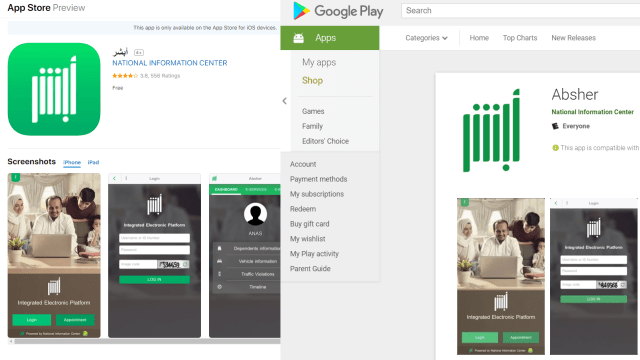Apple’s App Store and Google’s Play Store both continue to host a Saudi government app, Absher, that allows men in the country to track their female relatives’ movements and restrict their travel.
According to the Washington Post, the Saudi Interior Ministry-designed app serves as an e-government and e-services portal, including functions like requesting a passport, birth certificate, vehicle registration, or other documentation. But as a Business Insider piece last week noted, it also allows for male Saudis “to specify when and how women can cross Saudi borders, and to get close to real-time SMS updates when they travel.”
Absher can be used to restrict which destinations Saudi women can travel to, as well as prevent them from travelling anywhere outside the country at all, and the SMS notification system is used to alert the men if the women try to leave on their own.
That’s a pretty big deal, given that women in Saudi Arabia live under a patriarchal “guardanship” system which requires them to be a legal dependent of a man—and get that man’s permission to attend school, manage their work and finances, marry, and travel abroad or in public. Women are also required to have male chaperones in many situations and have fewer legal rights than men, and they can be arrested for “disobedience.” Absher certainly appears to automate elements of this system, and as the Post noted, the ministry claims it has 11 million users.
Critics say the app violates policies on both stores, such as those against bullying and harassment.
“We call on Apple and Google to assess the risk of human rights abuses on women, which is facilitated by the App, and mitigate the harm that the App has on women,” Amnesty International told the Post in a statement. “The use of the Absher app to curtail the movement of women once again highlights the disturbing system of discrimination against women under the guardianship system and the need for genuine human rights reforms in the country, rather than just social and economic reforms.”
Human Rights Watch senior researcher on women’s rights Rothna Begum told NPR the app was “really designed with the men in mind. Of course, it’s incredibly demeaning, insulting and humiliating for the women and downright abusive in many cases, because you’re allowing men absolute control over women’s movements.”
Democratic Senator Ron Wyden also blasted Google and Apple for hosting the app on Monday, saying hosting it was “unconscionable” and enables “abusive practices against women in Saudi Arabia.”
It is unconscionable that @Google and @Apple are making it easier to track women and control when and how they travel. These companies shouldn’t enable these abusive practices against women in Saudi Arabia. https://t.co/RDhZoTiQnP
— Ron Wyden (@RonWyden) February 11, 2019
According to NPR, Begum said the app has proven useful to some women trying to flee oppression—but only because they were able to surreptitiously steal their guardian’s phone and use it to remove travel restrictions.
The app remained available for both iOS and Android as of late Tuesday evening. On Monday, Apple CEO Tim Cook told NPR “I haven’t heard about it, but obviously we’ll take a look at if if that is the case.”
NPR wrote:
Apple and Google have different systems for flagging inappropriate apps. Apple prescreens apps, and Begum says Google relies on its users to alert it about violations. But, she says, each company needs to boost scrutiny of government-supported apps, especially when they are created by repressive regimes.
“They should consider the human rights implications … especially when it’s offered by a government,” she says. “When they’re evaluating whether an app should be allowed … providers really should consider the broader context or the purpose of the app, how it’s being used in practice and whether it’s facilitating abuse.”
Apple and Google did not immediately return requests for comment on this story from Gizmodo, and we’ll update if we hear back.
However, this is far from the only Saudi government activity that has invited backlash as of late. Its authoritarian monarchy is currently under the de facto day to day control of Crown Prince Mohammed bin Salman, who has tried to portray himself as a tech-friendly reformer eager to modernise the country and build an economy not dependent on oil.
Under his tenure the kingdom has remained a U.S. military ally that receives large shipments of weapons from the states, despite the prince’s wide-ranging crackdowns on dissent and waging of a brutal war in Yemen characterised by allegations of war crimes.
Last year, Saudi agents tortured and murdered dissident journalist in self-imposed exile and Washington Post columnist Jamal Khashoggi at the country’s consulate in Istanbul, drawing widespread outrage and convincing many tech companies to pull out of a high-profile investment conference.
Donald Trump’s administration has responded by issuing glowing statements in support of the U.S.-Saudi relationship, continuing to sell the nation billions in weaponry, and suppressing intelligence reports on Khashoggi’s death.
